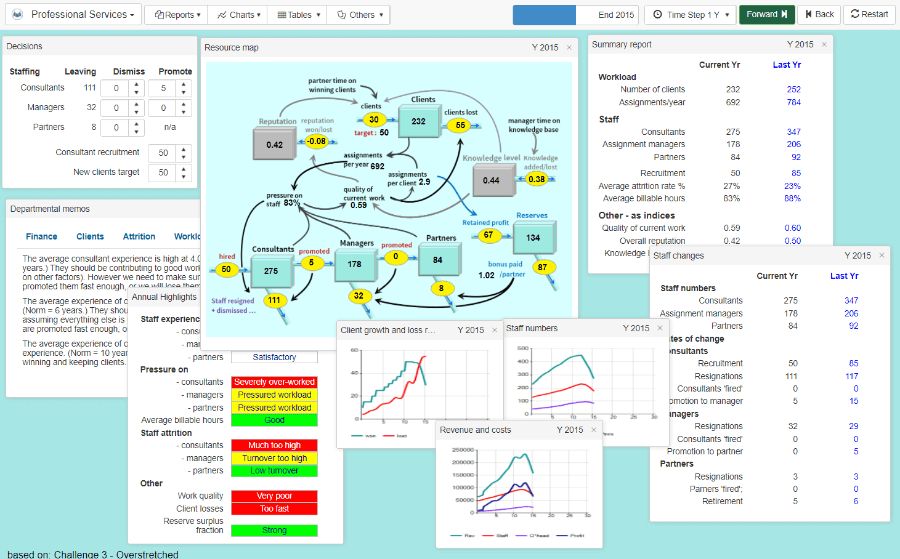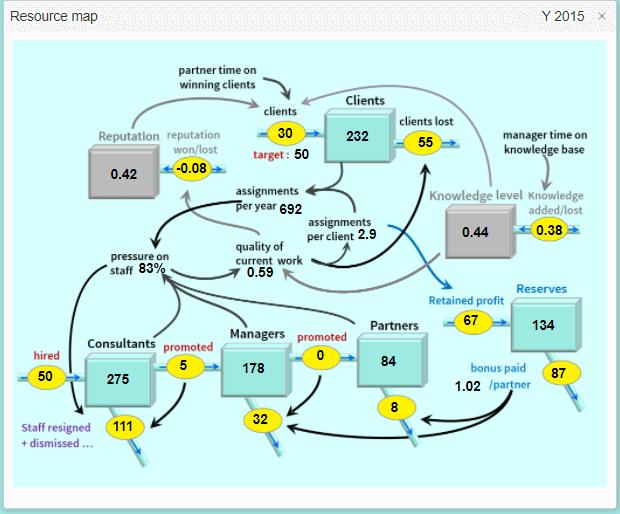Professional Services
Dynamics of service firms
This Microworld shows how staff capacity and experience develop through a hierarchy of high-performing professionals. Managed well, this business can grow and thrive. Managed badly, key professionals and clients will leave, leading to failure.
This game focuses on the special people-challenges faced by professional service organizations, issues that also confront service departments within other companies. Teams gain valuable insights into important issues common to many service-based situations, such as:
- driving growth in staff resources through several seniority levels, balancing recruitment, promotion and turnover
- matching growth in client numbers to the firm's capacity to serve them
- managing the growth of critical intangible resources, such as reputation and knowledge
The team take the role of the senior partner group in a large consulting firm, running over a very long time-scale. The business starts with 40 partners in total, 130 managers and 230 junior consultants. It has 60 clients and financial reserves of £40 million.
The simulation runs for 30 years, although useful challenges can look at shorter periods within that longer time-frame. Decisions take the form of key choices by the senior partners to steer the business for each year. They concern hiring, promotion, client-growth and knowledge-building.
Objectives
The partners themselves own the firm, so the general objective is to grow number of clients and project work, and do so profitably, so that the partners can share in the financial surplus generated each year (rather different from an investor-owned business). Objectives may also be chosen for other items, such as the annual bonus paid to each partner, or the quality and reputation the firm enjoys for its work.
Video introductions
Play Video
Video: A short introduction to the game interface, with audio (1.5 mins)
Play Video
Video: Longer introduction to the game interface, with audio (6 mins)

Features
This self-contained game is played online in a browser. It plays out business performance over a time-scale that is long enough to experience the complexity of strategy and decision-making. Teams control strategy by making a small number of key decisions, and can progress through the simulation at their own pace, trying alternatives and saving scenarios.
This is a substantial simulation that can also be supported by a popular Harvard case study on world-leading consultancy McKinsey & Co.
For trainers and academics: A full teachers pack is available including user's guide, management challenges and slide handouts. A fully annotated slide set is provided along with suggested teaching schedules, teaching plan, instructions on using the simulation, background information and references.
| Feature List | |
|---|---|
| DECISIONS | Eight decisions: Hiring of junior consultants, promotion of consultants to managers and promotion of managers to partner – firing of staff at all three levels is also possible – plus a target for the number of new clients to win each year and if chosen, the number of topics on which to build knowledge. Teams choose when to run forward and the simulation runs forward one month with each step, or teams can choose to repeat decisions over several months. A 'Go back' option allows previous decisions to be revised an alternative strategies explored. |
| PERFORMANCE FEEDBACK | Users get messages warning of serious problems – staff overload, client losses, and impending financial difficulties. In addition, there is a summary of annual highlights on the state of the business, and a traffic-light report on the same issues. |
| CHALLENGES | Five challenges included - part played scenarios that provide different situations for students to work with. |
| SAVE CHALLENGES | Teams can save the game at any point, to explore alternative strategies. |
| RESOURCE MAP | A 'Resource Map' of the business architecture showing key resource relationships. |
| REPORTS | Numerical reports showing relevant financial and operational data. |
| GRAPHS | Preset graphs showing the history of key data items. Additionally, Any item appearing in a table can be represented as a graph - simply double click on the table heading. |
| TABLE DATA | Tables show history of financial and service data, as well as a single table of all public data and one of user decsions. Tables can be exported in CSV format to enable analysis. |
| SAVE COMMENTS WITH GAMES | Can add comments to games either for display in games list or in a "Game Notepad". |
| COPY TO OTHER APPLICATIONS | Use screen capture to obtain images of Reports or Graphs for copying into other applications for inclusion in documents and slide presentations produced. |
| TEACHERS MATERIALS | Event managers materials include the user’s guide as well as instructor’s slides and slide notes. |
Uses
This game can be played by individuals or small teams. It plays out business performance over a time-scale that is long enough to experience the complexity of strategy and decision-making. Teams control strategy by making a small number of key decisions, and can progress through the simulation at their own pace, trying alternatives and saving scenarios.
Event materials include the user's guide for students and, for instructor's, slides and slide notes.
The courses in which it may be useful are:
Strategy Dynamics - the business resource-system, interdependence between firm resources, managing functions in harmony (sales and advertising).
Strategy courses or workshops - basics of resource-based view (RBV): connection between resources and performance.
Systems thinking courses or workshops - resource-building and feedback (reinforcing)
Key learning points
Business performance over time (clients, reputation, financial surplus) depends on the resources we have.
Resources are won and lost over time (clients today = sum of all clients ever won, minus all ever lost).
Resources bring with them a characteristic contribution to the rest of the system (staff carry with them an increasing level of experience, that determines their contribution to client-service quality).
Robust growth depends on a continuing balance between resources.
Imbalances may damage critical intangible factors (reputation, pressure on staff, knowledge-base)
Additionally:
Professional organisations may choose amongst several performance objectives - growth, reputation, partner-wealth - each with its own implications for how the organisation is managed through time.
Appropriate policy choices (hiring, promotion, client-development) will vary, depending on the state of the business and the direction in which it is moving.
Choosing to devote effort to build and sustain a knowledge-base of codified learning from experience with clients is time-consuming, demanding effort from professionals who would otherwise be serving clients. However, this resource drives better quality work, enhances reputation, and eases client-acquisition.
Professional staff are motivated by challenging work, promotion prospects and likely future rewards (amongst other factors), and providing these benefits depends on skillful development of staff and clients.

Reviews

Based on a management consultancy firm this game focuses on the special people-challenges faced by professional service organizations, issues that also confront service departments within other companies.
Teams gain valuable insights into important issues common to many service-based situations.
Play a demo
Teachers can request access to full game and inspection documentation for evaluation